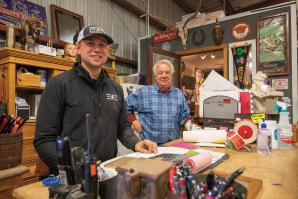The pandemic recession has shaped businesses in big and small ways, and its impacts have reached employers, employees, suppliers and customers. Just ask Liz Reego, who co-owns the six La-Z-Boy Home Furnishing & Decor showrooms in Sacramento, Roseville, Gold River, Elk Grove, Chico and Redding with her husband, Jim Reego. (The Reegos operate their business under a licensing agreement with Michigan-based parent company La-Z-Boy.)
How has the business evolved, or how have you pivoted your business to survive or thrive during this time?
As it was for so many businesses, the shutdown due to COVID-19 was difficult on our furniture stores and, of course, for our staff. Jim and I were very grateful for the (Paycheck Protection Program) that allowed us to continue to support most of our coworkers during that time.
How exactly did the PPP assist your employees?
We were able to quickly hire our staff back even before the counties allowed us to reopen our business, which allowed us to keep most of our staff. In turn, this helped their families financially and kept them available for when we were able to open.
What are the implications of the COVID-19 changes in business protocols for your sales revenue — brick-and-mortar and online?
Much of our support staff now works from home. Actually, even with COVID-19 restrictions, revenue is up in most store locations, as we feel customers are comfortable with how well we are protecting their health in our stores through our protocols. While online business is slightly up, the reality is that customers still want to feel the fabrics or leathers, try the comfort of the cushions, make sure the sofa or chair fits properly to their varying sizes and interact with our professionals to avoid costly home furnishings mistakes. While being able to use Google Meets for those customers who may live far away, have health concerns or don’t have a lot of time to shop will surely continue to grow, we know that having actual brick-and-mortar stores works best for the vast majority of customers. A case in point: Most online furniture has a 25-40 percent return rate. We have less than 1 percent because our staff works very hard to ensure that the customer chooses the right home furnishings pieces the first time.
We have also had to initiate COVID-19 policies for our staff. For example, if they travel out of the state, they are required to quarantine for 10 days and test before returning (to the store). Of course, if anyone feels ill, they stay home and if symptoms of COVID-19 are present, they must test negative before returning.
Since reopening, business has been extremely strong as people are spending more time at home and want to update their interiors while also being enveloped by comfort. Because all of La-Z-Boy manufacturing facilities are in America (with one in northern Mexico), we have quicker access to product than many other stores from our huge warehouse in Ontario, California stocked with furniture. However, lately, due to the COVID-19 safety improvements that the factories had to install and the increase in business across the country, the lead times for some of our special-order products has been pushed out, which is frustrating. …
Another area we had to adjust was in our successful in-home design business due to the fact our stores offer a full complement of home furnishings products. … At first, we decided to halt in-home visits for a few months. This gave us the opportunity to teach all the designers to perform much of their work in-store and online via Google Meets, allowing some customers nervous about coming into our stores to shop from home and receive the design layouts and product selections virtually. … While our designers are now visiting clients in their homes when requested, we are still providing much of the design-focused interactions virtually, which allows us to take care of more customers than before.
Before we reopened, we researched what would be the most important changes needed to ensure the safety of our entire staff — salespeople, designers, executives and support staff. First, we provide our staff with masks, sanitizers, gloves and access to a forehead thermometer to test for fever. For our customers, we have sanitation stations at the front of each store with gloves, masks and sanitizers, and require customers to wear masks and clean their hands before entering the showroom. We rotate staff to the front door so customers can be escorted throughout the store, ensuring we clean areas such as tabletops and recliner handles after use. … We shortened the times for being open from 10 a.m. to 6 p.m. versus closing at 8 p.m. so that several times a week, we can fog and disinfect the stores with hypochlorous acid, made from (salt, water and vinegar). It is … safe enough for even food use.
What advice would you give other business owners?
Jim and I have had to make some tough calls during this pandemic. First, you must make the adjustments necessary to conduct business as safely as possible. For example, you must have the courage to tell a customer who will not wear a mask that they have to leave because your first priority is to ensure the safety of your coworkers and other customers, some of whom may be at increased health risk. Continue to monitor compliance of your staff on your protocols. Now is not the time to relax.
Keeping significant cash flow reserves to ensure you can meet financial demands if business softens from time to time due to state orders, Jim suggests. I like to check in from time-to-time with how staff members are faring — not just in business, but also at home. Stay in touch with your employees. How is their stress level? What can you do to help alleviate some of their concerns? It is so important that your employees also feel free to talk to HR about any worries they may have. …
Work diligently to ensure you have all safety supplies in stock. From surgical and N95 masks, sanitizers, gloves, and fogging solution, do not relax and run out. And keep your staff updated on where they can get free testing.
–
Stay up to date on the effects of the coronavirus on people and business in the Capital Region: Subscribe to the Comstock’s newsletter today.
Recommended For You

Retail Projects in the Works for West Roseville
Residents in fast-developing part of south Placer County have been underserved
As west Roseville’s residential communities have rapidly developed in recent years, spreading farther toward the western border of Placer County, there have been few commercial amenities while developers have waited for a critical mass of population that could support new shopping centers.

Off the Beaten Track: Making New Look Old
Water Street Antiques & Interiors also specializes in building furniture
Water Street Antiques & Interiors, founded in 1972 by Terry
and Christine O’Neill, isn’t just an antique store.

Main Street: No Horsing Around
A growing equine community has helped boost business for a Granite Bay feed and pet-supply store
DeeDee and Craig Lyman own a feed store in a community of equestrians and animal lovers.

The ‘95630 Experience’
Folsom City Manager Elaine Andersen on the city’s growing opportunities and small-town feel
Comstock’s spoke to Andersen about the Folsom Plan Area, which will add housing, schools, parks, and commercial and office buildings, and bring in an estimated 25,000 new residents.



